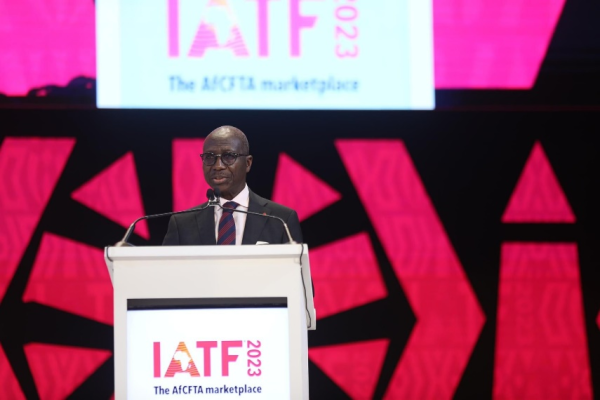Our Terms & Conditions | Our Privacy Policy
Experts seek bold, coordinated investment to unlock Africa’s economies
Participants who gathered at the ongoing 4th edition of the Intra-African Trade Fair (IATF) in Algiers, Algeria, have stressed the need for Nigerian and African leaders to take decisive action in addressing the continent’s persistent infrastructure challenges, identified as a major barrier to sustainable development and economic growth.
The stakeholders who spoke at a plenary session with the theme: ‘Delivering infrastructure to unlock new opportunities,’ argued that failure to address the issue of infrastructure head-on across the region and the continent, Africa would continue to lag in global competitiveness, struggle to attract meaningful investment and miss critical opportunities for inclusive economic growth, regional integration, and sustainable development.
According to them, without adequate infrastructure, particularly in the areas of transportation, energy, water, and digital connectivity, Africa cannot fully unlock its economic potential, support industrialization, or facilitate seamless trade under frameworks such as the African Continental Free Trade Area (AfCFTA).
They noted that bridging the infrastructure gap requires strong political will, innovative financing mechanisms, public-private partnerships, and regional collaboration to ensure that infrastructure projects are inclusive, sustainable, and strategically aligned with development goals.
Acting Director of Economic Development, Integration and Trade, and Head of Economic Policy and Sustainable Development at the African Union, Dr. Patrick Ndzana Olomo underscored the critical importance of large-scale infrastructure development as a foundational pillar for driving economic growth and deepening regional integration across the continent.
Olomo emphasised that the absence of modern and efficient infrastructure—particularly in key sectors such as transportation, energy, and digital connectivity- poses a significant obstacle to achieving the continent’s ambitions for accelerated growth, industrialisation, and competitiveness in global markets.
He pointed out that roads, ports, power grids, and digital networks are not merely support systems but strategic enablers of trade, investment, and productivity. Without robust infrastructure, he warned, efforts to stimulate intra-African trade, attract private capital, create jobs, and lift millions out of poverty would be severely constrained.
Olomo called on African governments, development partners, and the private sector to prioritise infrastructure investments and adopt coordinated strategies that can unlock the continent’s economic potential and secure a prosperous future for its people.
Also speaking, Vice Chairman of Tropical General Investment (TGI) Group, Nigeria, Farouk Gumel, urged stakeholders not to limit their focus solely to physical infrastructure such as roads and railways.
While he acknowledged the importance of tangible infrastructure in stimulating economic activity, he stressed that such activity is ultimately driven by people. Gumel argued that the less visible but equally essential ‘intangible’ infrastructure, such as investments in human capital, must not be overlooked.
According to him, for a road connecting point A to point B to truly generate economic value, there must be individuals along that route engaged in meaningful, productive work. He pointed out that building schools, training quality teachers, and producing skilled students is a fundamental part of this process.
These students, when empowered, go on to create value from raw materials, elevating them to standards that meet market expectations and contribute to broader economic goals.
Gumel pointed out that physical infrastructure alone does not speak for itself; it must be matched with strategic human capital investment to truly unlock its potential. He added that massive infrastructure spending must be underpinned by the assurance that the people who will utilise and sustain those systems are equally developed and empowered to drive value addition across the board.
Acting Chief Operating Officer of the Caribbean Office at Afreximbank, Okechukwu Ihejirika, identified inadequate infrastructure, especially poor sea and air connectivity, as one of the most pressing challenges facing the African continent.
However, he noted that despite these challenges, growing business imperatives and renewed interest in cross-regional collaboration are creating momentum for change.
According to him, Afreximbank is actively working to stimulate economic engagement between Africa and the Caribbean, especially in areas such as tourism and commercial trade.
This increasing exchange, he explained, is opening up a range of business opportunities that could catalyze much-needed infrastructure development.
By driving demand for improved transport and logistics systems, these opportunities have the potential to galvanize investments in critical infrastructure, ultimately strengthening ties between both regions and supporting long-term economic growth.
CEO of the Fund for Export Development in Africa, Marlene Ngoyi emphasised the critical need for infrastructure projects across the continent to be designed with trade facilitation at their core.
She cautioned against investing in isolated or disconnected infrastructure initiatives that serve no broader economic purpose, noting that Africa cannot afford to repeat past mistakes.
According to her, infrastructure must serve as a catalyst connecting roads, enabling access, and encouraging complementary developments to follow. She highlighted that the infrastructure model inherited from the 1960s is outdated and ill-suited to the demands of today’s Africa.
She added that the continent now needs to reimagine its connectivity with a bold, forward-thinking mindset, one that fosters regional trade, encourages integration, and reinvents roads and borders in ways that are functional, sustainable, and future-proof.
Images are for reference only.Images and contents gathered automatic from google or 3rd party sources.All rights on the images and contents are with their legal original owners.



Comments are closed.